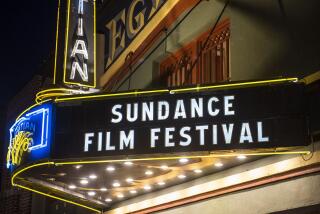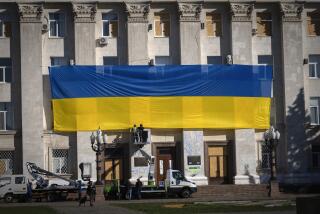In war-torn Ukraine, a film festival as tonic
In early May, this picturesque city on the Black Sea suffered a surprising, gruesome tragedy. Forty-eight people were killed when Ukrainian nationalists and pro-Russian separatists faced off in a bloody street fight that culminated in a fire at a trade-union building. It was the most deadly civil conflict to visit Odessa in 95 years.
People here still talk of the day in hushed tones, referring to it only as “the events of the Second of May.” Impromptu memorials have been erected along the route where victims died. The trade union’s hollowed-out center and badly charred facade are still easily visible in the center of town.
And yet just a few blocks away this week, a very different scene unfolded: Odessa played host to a film festival.
“There was never any question we would go on,” said Julia Sinkevych, the festival’s executive producer. “The only question was whether anyone would join us.”
From the balmy beaches of the Riviera to the snowy mountains of Utah, film gatherings are gauged by glitzy metrics — the number of celebrities who attend, the value of the distribution deals that are signed.
For the Odessa Film Festival, though, success is measured by a simpler standard: the fact that it exists at all.
Yet somehow the confab, which closes Saturday, has done that and more over the past week as it celebrated its fifth edition against all conceivable odds. In an old Soviet music hall, a festival program director and actor introduced a Georgian-Ukrainian favorite titled “Blind Dates”; the film is a delicate comedy about an emotionally stunted 40year-old who becomes involved with a woman and her ex-con husband.
In another theater, a bloc of student-made short films was being shown. The young filmmakers, their families and friends crammed the theater stairs, popping up opens bottles of beer and making up in enthusiasm what their films lacked in polish.
Director Stephen Frears turned up as a guest of honor. Darren Aronofsky conducted a question-and-answer session via Skype. Acclaimed movies like “Boyhood” and the 2014 Palme d’Or winner “Winter Sleep” made their national premieres.
And nearly 15,000 people turned out for a screening of a rare silent version of Alfred Hitchcock’s 1929 thriller “Blackmail,” accompanied by an orchestra, on the city’s iconic Potemkin Steps.
Ukraine continues to be an embattled place in the wake of the bloody EuroMaidan revolution in Kiev that deposed former leader Viktor Yanukovich, after the annexation of Crimea by Russian President Vladimir Putin this spring and in the current throes of a war with pro-Russian separatists in the country’s eastern region. On Thursday, a Malaysian Airlines plane was downed in the troubled airspace over the eastern city of Donetsk, about 450 miles away, and locals reacted with an all-too-familiar mix of sadness and resignation.
That night, a moment of silence preceded all screenings. The closing Saturday is being similarly scaled down, with a silent red carpet, in tribute to those who died in the disaster. This follows a decision on opening night, when the death of several Ukranian soldiers in the conflict with separatists prompted organizers to hold a moment of silence too.
While a series of screenings and panel discussions might seem beside the point for people worried about family members on the front lines — or concerned about an economy that’s currently one of the worst in Europe — festival organizers believe it contains some surprising relevance.
“This was a chance to do something for the people,” said Victoria Tigipko, the festival’s president, who is also married to a former vice prime minister of Ukraine. Tigipko said the goal was in part to bring industry players from across Europe together to shine a light on the Ukrainian film industry, but that mainly it was to mount an event for the city’s nearly 1 million residents.
“We realized that with everything else going on what people really might need is entertainment,” she said.
That goal proved easier said than done.
Sinkevych, a formidable young woman who was promoted to festival executive producer in January after the departure of predecessor Denis Ivanov, watched over the last six months as sponsors pulled out, then Russian tourists and journalists withdrew. Filmmakers were getting cold feet too, especially in the wake of the May 2 calamity.
So Sinkevych began scrambling. She launched a crowdfunding campaign. She called the director of the Sarajevo Film Festival, which also took place during wartime, for some advice on how to strike the right balance between celebratory and respectful. (“Tell me how I’m supposed to make a festival during a war?” she recalled asking him.) She even sought to persuade national embassies to delete travel warnings for Odessa, which has been peaceful since May 2, from their Web pages.
Budgets, meanwhile, were slashed by nearly 50% to save money. She then persuaded volunteers, audience members and industry people from outside the country to come despite the stigma Ukraine carried. “I’m not the favorite of anyone’s mother’s right now,” she laughed in an interview this week. “Someone I know said to me when she arrived, ‘I’m really glad to see you — and my mother doesn’t send her best regards.’”
She and her team also worked on Hollywood stars. Attracting celebrities isn’t easy for any small festival — let alone one perceived to be in a war zone.
Some did expressly want to come and learn about Odessa and its immigrant-rich history. as Frears did. The British director Peter Webber turned out too and gave a masterclass.
But organizers may have slightly overplayed their hand when they booked Michael Douglas’ new romantic comedy, “And So It Goes,” in the hope he might turn up because, well, Kirk Douglas was born in Odessa. “We figured it was worth a try,” said program director Alik Shpilyuk, shrugging. (Douglas stayed home.)
With the geopolitical conflict continuing, the festival also realized it needed to overhaul its program. An annual section done in conjunction with the Russian culture ministry was obviously out. So the festival came up with a new section, called “Way to Freedom,” which showed both political films about Ukraine — including the Ukrainian director Sergei Loznitsa’s new Cannes movie, “Maidan,” about the Kiev protests, in a tearful screening — and “The Square,” the Oscar nominee about the Egyptian uprising.
“We needed to find a way to say that this isn’t just about Ukraine,” Shpilyuk said. “Even though, in many ways, it is.”
Features could be subtly political too. Ukrainian Volodymyr Tykhyy’s “The Green Jacket,” about a boy who goes missing, is laden with metaphor about a Ukraine that’s lost its way. The director said he saw it as a hopeful film in the wake of the EuroMaidan. “If we made the film two years ago it would have had a different ending,” he said.
The festival also held a fundraiser for Oleg Sentsov, the Crimean filmmaker who’s been jailed and charged with terrorism by Russian authorities, showing his 2011 video-game feature “Gaamer.”
“They’re accusing him of terrorism, but everyone who knows Oleg in person or his films will know he’s not only unsuitable but that it’s absurd to accuse him and friends of this,” said Olga Zhurzhenko, who produced “Gaamer.”
And at an outdoor screening for a new period film about the ejection of a Crimean minority by the Soviets at the end of WWII, moviegoers turned out with large Ukrainian flags, which they began waving when the screening ended. Sinkevych said she saw events like this as a sign that “people want to feel united right now.”
It isn’t always that simple, of course. Though the festival, like most such gatherings, aims for an ethos of inclusion (juries contain several Russian film personalities), anyone who supported the annexation of Crimea was “of course not going to be invited,” Shpilyuk said.
The gathering, in a sense, marks a return for festivals to their more substantial roots. Though sometimes known these days for red-carpet galas, fests historically have come attached to political and other crises, from the labor unrest that prompted the stoppage of the 1968 Cannes Film Festival to the inception of the Sarajevo Film Festival during the siege of the city in 1995 to the formation of the Tribeca Film Festival months after Sept. 11.
But some here may not want to think about that backdrop too much. Roman Byshlyaga, a 24-year-old engineer from Odessa, has taken a week off work to come to the festival. “I really want to watch movies,” he said as he stood outside one screening. “It’s tiring to talk politics all the time.”
Twitter: @ZeitchikLAT
More to Read
Only good movies
Get the Indie Focus newsletter, Mark Olsen's weekly guide to the world of cinema.
You may occasionally receive promotional content from the Los Angeles Times.







